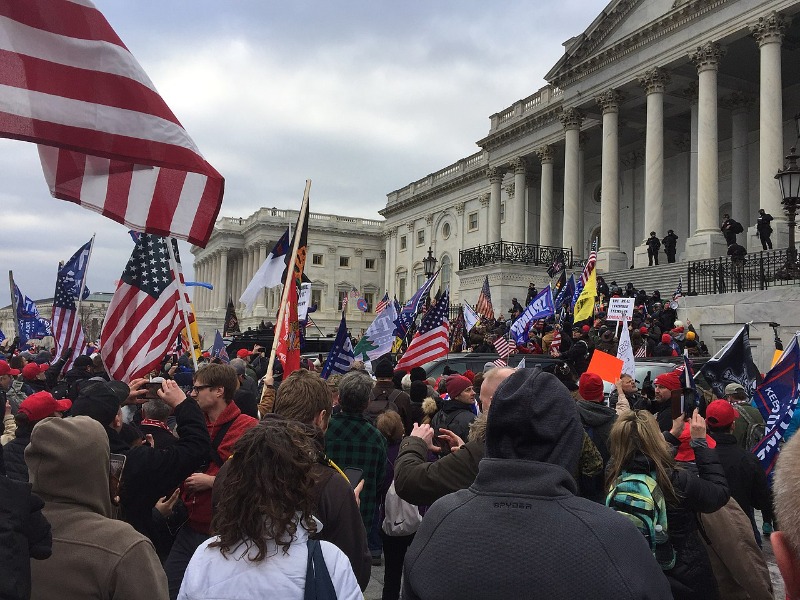Lawfare Resources on Right-Wing Extremism, Domestic Terrorism and De-platforming
On Aug. 4, in Dayton, Ohio, a gunman opened fire and killed nine people. The day before, another shooter killed 22 people in El Paso, Texas, apparently after posting a racist message to the anonymous online forum 8chan decrying an ostensible “Hispanic invasion of Texas.” Though there is no indication so far that the Dayton shooting was motivated by extremist political beliefs, the violence in El Paso is the third mass shooting in 2019 to be linked to 8chan and to some form of far-right extremism.

Published by The Lawfare Institute
in Cooperation With

On Aug. 4, in Dayton, Ohio, a gunman opened fire and killed nine people. The day before, another shooter killed 22 people in El Paso, Texas, apparently after posting a racist message to the anonymous online forum 8chan decrying an ostensible “Hispanic invasion of Texas.” Though there is no indication so far that the Dayton shooting was motivated by extremist political beliefs, the violence in El Paso is the third mass shooting in 2019 to be linked to 8chan and to some form of far-right extremism.
The events of this weekend raise a number of questions about extremism and the proper response to it, some distinct and some nestled inside each other. We will be posting material specifically about these cases in the days to come, but Lawfare writers have thought through a wide range of these issues over the past two years—and in this post, I’ve collected our past coverage here, grouped thematically, as the country responds to the most recent violence.
Hate crimes or terrorism? The rise of domestic violent extremism within the United States creates particular difficulties for federal law enforcement. While U.S. law incorporates a definition of domestic terrorism, there is no federal law criminalizing such actions per se, and the most commonly charged crimes listed under “Terrorism” in the U.S. Code relate to acts of international terrorism—terrorism committed with some kind of link to a foreign terrorist organization. This creates an often-commented-upon distinction between acts of violence that are prosecuted as terrorism by federal law enforcement (such as those committed by people who have pledged loyalty or otherwise provided service to militant Islamist organizations like the Islamic State) and acts that have a similarly political motive but lack a link to a foreign terrorist organization (like the El Paso shooting), which are often prosecuted as hate crimes. Writing in 2015, Jane Chong and Susan Hennessey provided more details on this distinction in nomenclature:
- “White Hate but Islamic Terror? Charleston, Hate Crimes and Terrorism Per Quod,” Jane Chong
- “The Good Reasons to Not Charge All Terrorists With Terrorism,” Susan Hennessey
How should law enforcement respond? One way to address this disparity in what is and is not prosecuted as terrorism would be for Congress to criminalize domestic terrorism—though critics worry that such a law could infringe on civil liberties. But legislation is not the only route through which the federal government might change its approach to counter far-right extremism. In the wake of the Christchurch shooting, Josh Geltzer, Mary McCord and Nicholas Rasmussen argued that governments should engage in greater international collaboration to combat violence that no longer fits within the framework of domestic terrorism, and that the National Counterterrorism Center’s mandate should be expanded to include this type of terrorism as well:
- “Criminal Law Should Treat Domestic Terrorism as the Moral Equivalent of International Terrorism,” Mary McCord
- “American Terrorists: Why Current Laws Are Inadequate for Violent Extremists at Home,” Jason Blazakis
- “It’s Time for Congress to Make Domestic Terrorism a Federal Crime,” Mary McCord
- “The Lawfare Podcast: Mary McCord and Jason Blazakis on Criminalizing Domestic Terrorism”
- “A Road Map for Congress to Address Domestic Terrorism,” Mary McCord and Jason Blazakis
- “The Christchurch Shooting: Domestic Terrorism Goes International,” Josh Geltzer, Mary McCord and Nicholas Rasmussen
How should internet platforms respond? Two days after the El Paso shooting, Cloudflare—the network provider whose protection allowed 8chan to remain on the internet—pulled its services. 8chan’s backup provider quickly folded, and as of Monday afternoon, the site has vanished from the internet, though it may yet return. The questions of if, when and by whom noxious websites should be forced from the internet are difficult ones without obvious answers. To begin with, such removals raise concerns over free speech and the ability of private companies to police access to the internet. There is also the matter of whether removing extremist content might have unanticipated consequences. The United States is not alone in this debate, however—other countries are also grappling with how to respond to online hate that sometimes blurs into outright violence.
- “Whose Responsibility Is It to Confront Terrorism Online?” Seamus Hughes
- “Gab Vanishes, and the Internet Shrugs,” Quinta Jurecic
- “Social Media Content Moderation: The German Regulation Debate,” Nele Achten
- “De-platforming and the Online Extremist’s Dilemma,” Bennett Clifford and Helen Christy Powell
- “How Content Removal Might Help Terrorists,” Joe Whittaker
- “Two Calls for Tech Regulation: The French Government Report and the Christchurch Call,” Evelyn Douek
Is there an increase in far-right extremism? As many observers have noted, the 8chan post that appears to have been produced by the El Paso suspect includes language about Latinos and immigrants very similar to that used by the president himself—who has in the past referred to immigration across the U.S.-Mexico border as “an invasion of our Country.” Trump’s presidency has seen a number of violent acts by attackers with far-right views, from Charlottesville in August 2017 to El Paso almost exactly two years later. On Lawfare, a range of writers—myself included—have discussed the increasing prominence of right-wing extremist violence, particularly in the wake of the March 2019 shooting in Christchurch, New Zealand:
- “CVE for White People: The Trumpist Movement and the Radicalization Process,” Quinta Jurecic and Benjamin Wittes
- “President Trump, Quebec and the Dismantling of CVE,” Quinta Jurecic
- “Far-Right Extremism and the Christchurch Massacre: Adapting to New Threats,” Carrie Cordero
- “Five Initial Thoughts on the New Zealand Terrorist Attack,” Dan Byman





